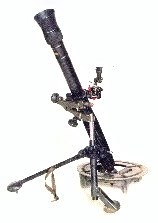M252 mortar
| M252 mortar | |
|---|---|
| Type | Mortar |
| Place of origin |
|
| Service history | |
| In service | 1987–present (United States) |
| Used by | Operators by Country |
| Wars |
Gulf War War in Afghanistan Iraq war |
| Specifications | |
| Weight | 41.3 kilograms (91 lb) |
| Length | 50 in (127 cm) |
| Barrel length | 1.27 metres (4 ft 2 in) |
| Crew | 5 |
|
|
|
| Caliber | 81 millimetres (3.2 in) |
| Elevation | 45°–85.2° |
| Traverse | 5.6° |
| Rate of fire | 8–16 rpm sustained 20–30 rpm in exceptional circumstances and for short periods |
| Effective firing range | HE: 91–5,935 m (99–6,490.6 yd) |
| Feed system | muzzle-loaded |
The M252 81 mm medium weight mortar is a British designed smooth bore, muzzle-loading, high-angle-of-fire weapon used for long-range indirect fire support to light infantry, air assault, and airborne units across the entire front of a battalion zone of influence. In the U.S. Army and U.S. Marine Corps, it is normally deployed in the mortar platoon of an infantry battalion.
The M252 system weighs 91 lb (41 kg) completely assembled and is composed of the M253 Cannon (35 lb, 16 kg), M177 Mount (27 lb, 12 kg), M3A1 Baseplate (29 lb, 13 kg), and the M64A1 Sight Unit (2.5 lb, 1.1 kg). The mount consists of a base plate and a bipod, which is provided with screw type elevating and traversing mechanisms to elevate/traverse the mortar. The M64A1 sight unit (also used on the M224) is attached to the bipod mount. The M252 is a gravity-fired smoothbore system. Attached to the muzzle of the weapon is the Blast Attenuation Device (BAD), used to reduce the blast effects on the mortar crew. To increase cooling efficiency, the breech end is finned; though first-hand accounts attest that the level of cooling is negligible. The cannon also has a crew-removable breech plug and firing pin.
High explosive rounds fired by the M252 weigh 10 lb (4.5 kg) and can have an effective kill radius of 35 m (115 ft).
The M252 is an adaptation of the British 81mm L16A2 mortar developed in the 1950s. It entered service with the U.S. Army and replaced the previous 81 mm M29 mortar in 1987. It was adopted due to the extended range (from 4,500 meters to 5,650 meters) and enhanced lethality. In the U.S. it is produced by Watervliet Arsenal.
...
Wikipedia

